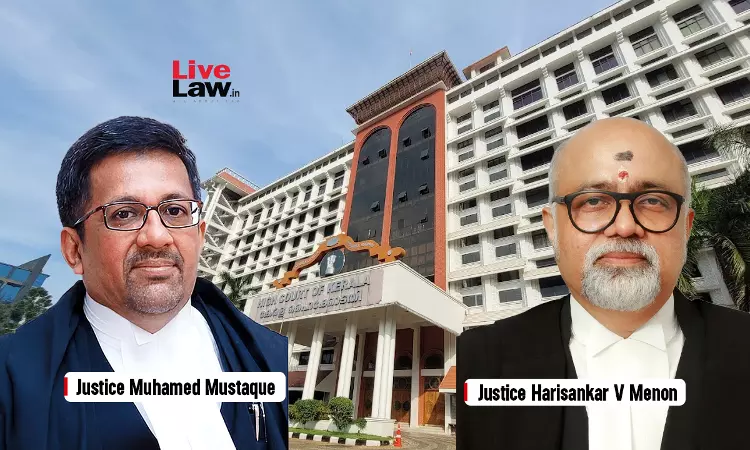- Home
- /
- High Courts
- /
- Kerala High Court
- /
- Revisional Powers U/S 56 KVAT Act...
Revisional Powers U/S 56 KVAT Act Are Limited, Clarificatory Orders Have Only Prospective Effect: Kerala High Court
Mehak Dhiman
4 Oct 2025 4:40 PM IST
The Kerala High Court stated that revisional powers under Section 56 of the KVAT Act (Kerala Value Added Tax Act, 2003) are limited, and clarificatory orders only have a prospective effect. Justices A. Muhamed Mustaque and Harisankar V. Menon stated that with reference to the power to issue clarification under Section 94 of the Act, the Commissioner has been empowered to hold...
The Kerala High Court stated that revisional powers under Section 56 of the KVAT Act (Kerala Value Added Tax Act, 2003) are limited, and clarificatory orders only have a prospective effect.
Justices A. Muhamed Mustaque and Harisankar V. Menon stated that with reference to the power to issue clarification under Section 94 of the Act, the Commissioner has been empowered to hold that clarificatory orders would only have prospective operation. In other words, the exercise of the power by the Commissioner under Section 94(2) of the Act is independent of the power of the authority to issue clarifications.
The assessee is engaged in the trading of “thermic fluid heater”, which, according to him, attracts tax at 4% under Entry 83(1)(f) of Schedule III to the Kerala Value Added Tax Act, 2003.
The assessment-imposed tax at the rate of 12.5% on the afore item, placing reliance on a clarification of the Commissioner of Commercial Taxes, as per which, the tax payable was at 12.5%.
The assessment was challenged before the first appellate authority, and the first appellate authority noticed that the clarification relied on while finalizing the assessment had been set aside by the Court, since there was no proper consideration of the issue by the Commissioner, and directed the Commissioner to revisit the issue afresh.
The assessing authority passed a fresh order imposing tax at 4% with respect to the products dealt with by the assessee.
Later, the authority under Section 94 of the Act issued an order dated 07.04.2016, holding that since “thermic fluid heaters” have not been specifically covered by any of the entries in Schedule III, the tax applicable would be at 12.5%.
Placing reliance on the proceedings of the authority under Section 94 as above, the Deputy Commissioner initiated suo motu revisional steps to cancel the order in favour of the assessee.
The Deputy Commissioner issued an order under Section 56(3) of the Act, cancelling the assessment order and remitting the matter for fresh consideration.
The suo motu revisional order as above was further challenged before the Commissioner of Commercial Taxes, essentially contending that the Deputy Commissioner did not have any jurisdiction to invoke the power under Section 56 of the Act.
The assessee has filed a revision petition challenging the suo motu steps initiated under Section 56 of the Act, which cancelled an assessment completed in his favour, as confirmed by the Commissioner of Commercial Taxes.
The assessee submitted that the exercise of the revisional power under Section 56(1) of the Act was erroneous insofar as the assessment was the subject matter of an appeal, and the order, which is now set aside, is the consequential order issued by the assessing authority.
As per the assessee, the commodity dealt by the revision petitioner was assessable only at the rate of 4% and the order issued by the Authority under Section 94 of the Act would not apply to the case at hand.
The bench observed that under Section 56 of the Act, the Deputy Commissioner (presently Joint Commissioner) is entitled to call for and examine any order passed or proceedings recorded under this Act by any officer or authority subordinate to him which, in his opinion, is prejudicial to the interest of the revenue and pass such orders thereon as he thinks fit after making the required enquiry in the matter.
The bench opined that if the clarificatory order dated 07.04.2016 is provided with any retrospective operation, an assessee would be seriously prejudiced, since it will not be possible for him to collect the differential tax from his customer. This is especially so, since under the Act, the Commissioner had the power to declare that the clarification would not have prospective operation. The reason stated in the impugned order for not exercising the power does not appear to be legal.
The exercise of the revisional jurisdiction under Section 56 of the Act cannot be sustained.
In view of the above, the bench disposed of the revision petition.
Case Title: K.G. Rejimon v. State of Kerala
Case Number: OT.REV NO.32 OF 2023
Counsel for Petitioner/Assessee: P.S. Soman and T. Radhamony
Counsel for Respondent/Department: V.K. Shamsudheen



